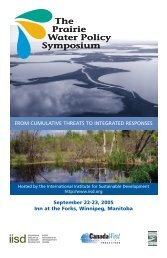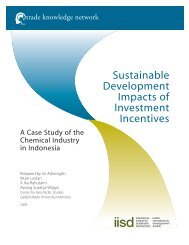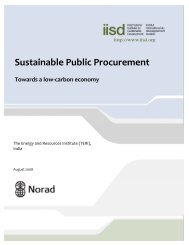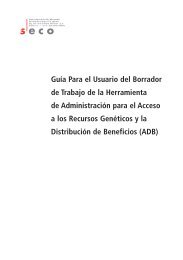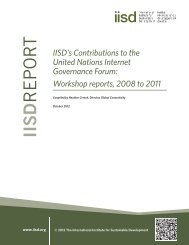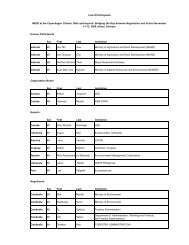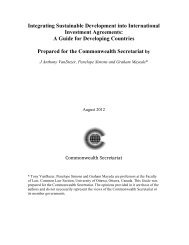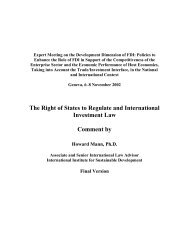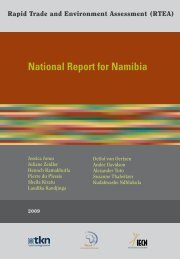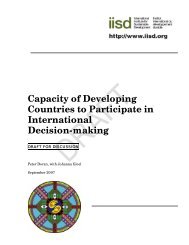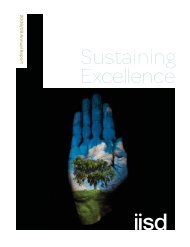Manitoba Climate Change Task Force - International Institute for ...
Manitoba Climate Change Task Force - International Institute for ...
Manitoba Climate Change Task Force - International Institute for ...
You also want an ePaper? Increase the reach of your titles
YUMPU automatically turns print PDFs into web optimized ePapers that Google loves.
2. <strong>Climate</strong> <strong>Change</strong> and <strong>Manitoba</strong><br />
6<br />
MCCTF Report 2001 — <strong>Manitoba</strong> and <strong>Climate</strong> <strong>Change</strong>: Investing in our future<br />
How is <strong>Manitoba</strong>’s <strong>Climate</strong> Changing?<br />
“<strong>Manitoba</strong> is a sensitive, vulnerable region and the current process of climate change<br />
is increasing our vulnerability and the number of extreme events (e.g., droughts,<br />
floods, permafrost shift).”<br />
Mike Balshaw • MWB Consulting Ltd.<br />
<strong>Manitoba</strong> will experience<br />
earlier and more severe climate change than many other parts of the world,<br />
largely due to our northern geography and location in the centre of the continent.<br />
What’s more, the importance of natural resources in our economy and the<br />
expansive, fragile nature of our northern environments have increased<br />
<strong>Manitoba</strong>’s exposure to the effects of climate change.<br />
The province is expected to experience average temperature increases of 4-6<br />
degrees Celsius by the end of this century. This is at the higher end of the range<br />
of warming that is predicted globally. 1 A mean temperature increase of this<br />
magnitude may not sound like much, but we know that our environment<br />
responds radically to temperature changes of even 1-2 degrees Celsius.<br />
Temperature changes greatly affect precipitation, water levels and other factors<br />
that are important to the environment and to <strong>Manitoba</strong>’s economy. Overall,<br />
precipitation is expected to increase, but will be less predictable and probably<br />
concentrated in severe weather events. Spring is predicted to arrive earlier and<br />
be warmer and wetter, leading to increased risk of flooding. Summer temperatures<br />
are expected to rise, leading to higher evaporation, though summer precipitation<br />
will probably decline by 10-20 per cent. While the growing season will be<br />
longer, water and drought management could become significant challenges <strong>for</strong><br />
<strong>Manitoba</strong>. In the fall, warmer temperatures would result in more frost-free days.<br />
And very sharp average temperature increases of 5-8 degrees Celsius could be<br />
expected in the winter. These changes would have major implications <strong>for</strong> all<br />
sectors. 2<br />
1 See, <strong>for</strong> example, Canadian centre <strong>for</strong> <strong>Climate</strong> Modeling and Analysis; CCC AGCM2 global plots at<br />
http://www.cccma.bc.ec.gc.ca. For a broader range of estimates of warming on the Canadian Prairies, see<br />
Herrington, Ross, Brian Johnson and Fraser Hunter. Volume III: Responding to Global <strong>Climate</strong> <strong>Change</strong> in the<br />
Prairies. In The Canada Country Study: <strong>Climate</strong> Impacts and Adaptation. Environment Canada, 1998.<br />
http://www.ec.gc.ca/climate/ccs/ccs_e.htm. For predicted mean global temperature changes between 1990 and<br />
2100, see Intergovernmental Panel on <strong>Climate</strong> <strong>Change</strong>, Working Group I, Third Assessment Report. Summary<br />
<strong>for</strong> Policy Makers, p.13. http://www.ipcc.ch/.<br />
2 <strong>Manitoba</strong> and <strong>Climate</strong> <strong>Change</strong>: A Primer. Winnipeg; <strong>Manitoba</strong> Clean Environment Commission and <strong>International</strong><br />
<strong>Institute</strong> <strong>for</strong> Sustainable Development, 2001. See also Herrington, Ross, Brian Johnson and Fraser<br />
Hunter. Volume III: Responding to Global <strong>Climate</strong> <strong>Change</strong> in the Prairies. In The Canada Country Study: <strong>Climate</strong><br />
Impacts and Adaptation. Environment Canada, 1998. http://www.ec.gc.ca/climate/ccs/ccs_e.htm.



